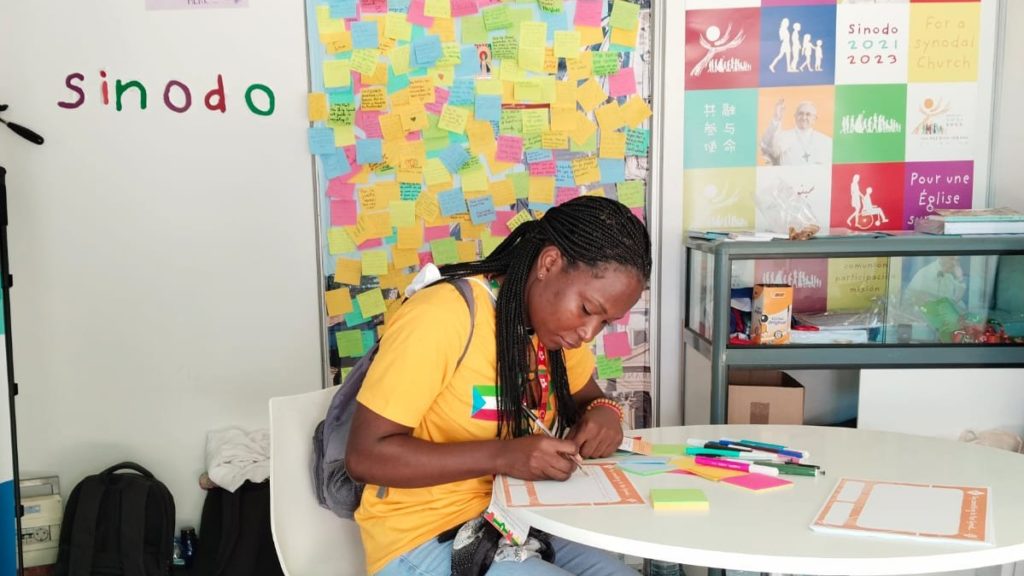With the approach of the assembly of the Synod of Bishops, a major event in the pontificate of Pope Francis, it was surprising that the pope did not use the word "synod" or "synodality" in any of his talks to the 1.5 million young people gathered in Portugal for World Youth Day.
If he thought young Catholics were not aware of the synod, of its vision and of some of the controversy surrounding it, he was wrong.
The staff of the synod secretariat went to World Youth Day in Lisbon prepared to explain "synodality" to young Catholics, but they found the pilgrims from around the world already knew about the synod assembly planned for October and about many of the issues proposed for discussion.
"Being in contact with the young people was amazing, really amazing," said Thierry Bonaventura, the synod communication manager. "Most of them knew about the synod, were ready to listen to more about it" and were eager to share their hopes and concerns.
The synod had a booth at the "City of Joy," a venue in a Lisbon park where religious orders and Catholic service and mission organizations interacted with young people throughout World Youth Day Aug. 1-6.
The young people who visited the synod booth left thousands of prayers for the synod and for the church written on Post-it Notes and hundreds of letters to Pope Francis and synod members on full-sized sheets of paper pre-printed with "Say something to the synod."
While Bonaventura and the synod staff were still sorting through the notes and letters back at the Vatican Aug. 9, he told Catholic News Service that the young Catholics' chief concerns were clear, and first on their lists was the unity of the church.
One unsigned Post-it prayer read, "That together we may grow both in unity & diversity. All are welcome."
And a message to the synod written in English signed by a German pilgrim said, "I hope that the synod will strengthen and renew the unity in the church and not lead to division. Please find a way to find all together in Christ."
Young Catholics in Lisbon told synod staff they want more time and space in the church dedicated to them, Bonaventura said, but not simply as recipients of ministry. They want the church to welcome their gifts and talents, for instance by using their skills in technology and social media.
Recognizing and expanding the leadership of women in the church and ensuring LGBT Catholics feel welcome also were top concerns, he said.
Another frequently repeated concern, "always repeated with this idea of unity in diversity," he said, was greater access to the pre-Vatican II Latin Mass.
On a "Say something to the synod" form, a young man from the United States wrote that the traditional Latin Masses he has attended are "the most beautiful Masses that I have ever been to," and he asked Pope Francis to end the restrictions on its celebration because they "exclude and ostracize a large group of faithful Catholics."
For Bonaventura, World Youth Day was a clear demonstration of synodality in action: Young Catholics from around the world literally walked together, joining "to praise the Lord, to deepen their knowledge of Jesus, to gather around the pope and listen to his teaching."
"And what astonished me a little bit, because I didn't know it was so strong, was their awareness of mission, of really helping others who don't know Jesus to know him," he said.
While Pope Francis did not talk about the synod to the young people, his "todos, todos, todos" refrain -- his insistence that all are welcome in the church -- and his encouragement to share the Gospel will joy resonated with the pilgrims and echoed the key points of the synod's theme: "For a Synodal Church: Communion, Participation and Mission."
Cardinal Robert W. McElroy of San Diego, who was appointed by the pope to be a member of the synod, told CNS, "His constant refrain that all are welcome in the life of the church -- that strikes young people very profoundly and beautifully."
"This is how God relates to us: first, wanting us to know we are loved; second, wanting us to know that God stands with us as we face the problems which weigh us down; and thirdly that God is helping us to change in our lives," the cardinal said.
Speaking to reporters on his return flight to Rome Aug. 6, Pope Francis said he knows some people don't like his insistence on welcoming everyone. A common objection, he said, is: "But young people don't always live life in accordance with morality."
"Who among us has not made a moral mistake in our lives? Everyone has," he continued. "Each of us has had downfalls in our own history. Life is like that. But the Lord is always waiting for us because he is merciful and is Father, and mercy goes beyond everything."
In welcoming and ministering to all, he told the reporters, "One of the important things is patience: accompanying people step by step on their way to maturity."
Although Pope Francis did not speak to the WYD pilgrims about the synod, it was a significant part of his homily Aug. 2 at a prayer service with bishops, priests and pastoral workers in Portugal.
"The church is synodal," he said. "She is communion, mutual assistance and shared journey."
"In the boat of the church, there has to be room for everyone: all the baptized are called on board to lower the nets, becoming personally involved in the preaching of the Gospel," the pope continued.
The model, he said, is "that passage of the Gospel in which the wedding feast of the son is all prepared, and people do not come to it. So, what does the Lord, the master of the feast, say? 'Go out to the highways and byways and bring everyone, everyone: the sick, the healthy, young and old, the righteous and sinners. Everyone!'"

